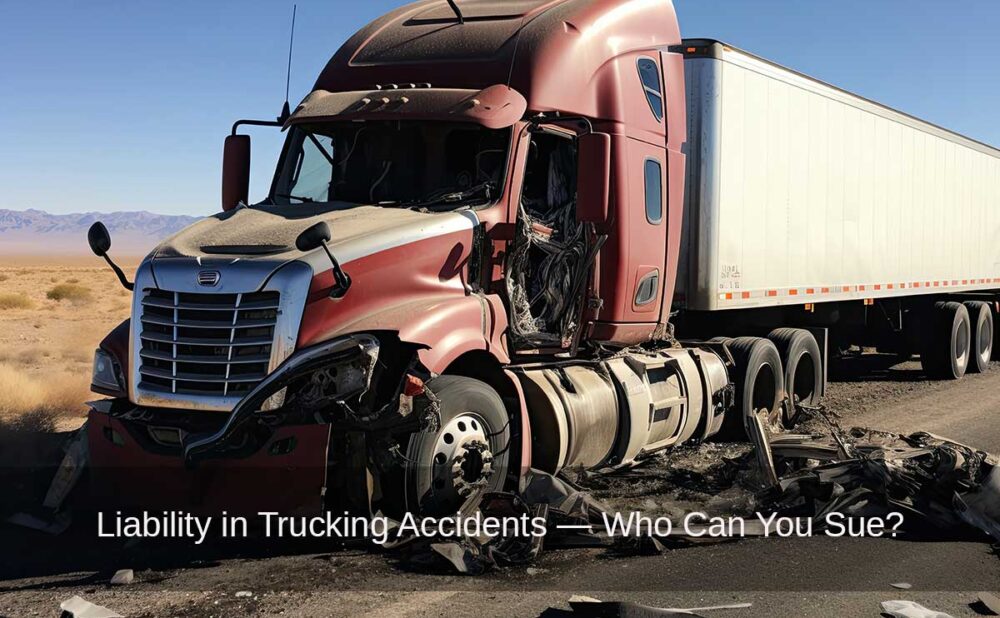Understanding Liability in Trucking Accidents — Who Can You Sue?
Determining who can be held liable for your injuries after a trucking accident can be complex. Often, it is feasible to pursue a personal injury claim against both the truck driver and their employer, as they may share responsibility for the wreck. However, it’s essential to recognize that there are exceptions to this general rule. For instance, if the truck driver was acting outside the scope of their employment at the time of the truck wreck—perhaps engaging in a personal errand instead of performing their work duties—the employer may not be held liable. This distinction is critical, as it can significantly affect the outcome of your personal injury claim. Furthermore, factors such as maintenance issues with the truck, adherence to safety regulations, and even the trucking company’s policies can influence liability in trucking accidents.
To navigate these complexities effectively, it is advisable to consult with a legal professional who specializes in personal injury cases, particularly those involving trucking accidents. An experienced attorney can help you gather the necessary evidence, understand your rights, and pursue all possible avenues for compensation. By doing so, you increase the likelihood of a successful outcome in your personal injury claim. Thus, ensuring that you receive the compensation you deserve for your injuries and damages sustained in the accident.
Suing the Trucking Company: Respondeat Superior
In cases where a driver causes an accident while on the job, the concept of Respondeat Superior holds the employer responsible for the employee’s actions. This legal doctrine establishes that the employer is financially accountable for the employee’s wrongdoing while performing job duties.
Thus, if a driver is operating within the course and scope of their employment at the time they injure someone in a car or truck wreck, the company is generally held liable for the resulting injuries under this legal doctrine. This Latin phrase translates to mean that the “master” (in this case, the employer) is financially responsible for the wrongdoing of the “servant” (the employee).
In the context of personal injury claims, this principle remains firmly established in modern Georgia law. If the employer acknowledges that the employee was on duty during the time of the collision, the employer is automatically responsible for damages if the employee was at fault for the wreck. Consulting with a knowledgeable truck accident lawyer is crucial in navigating these legal complexities.
Disputes may arise regarding the employee’s work status at the time of the accident. Employers might argue that the employee was off duty or engaged in personal activities unrelated to work. In such cases, determining liability becomes more nuanced.
Consider this scenario: A delivery driver, operating a company van, decides to veer off course. The driver stops at Walmart to purchase personal items. Subsequently, the driver collides with another vehicle in the parking lot. Here, the question of liability arises. In this case, the employer may contest responsibility since the employee was not performing their job duties at the time of the accident.
Insurance Coverage and Independent Contractors
Even if the employer is not held responsible, insurance coverage for accidents involving company vehicles should still apply. This assumes the driver had permission to operate the vehicle. If the driver used their personal vehicle, the driver’s personal policy may limit the victim’s liability insurance. This policy typically offers lower coverage than a corporate policy.
When the driver is an independent contractor rather than an employee, liability becomes more complex. While companies are generally not liable for damages caused by independent contractors, exceptions exist, especially in cases involving commercial vehicles subject to federal regulations.
Commercial vehicles are subject to Federal Motor Carrier Safety Regulations (FMCSRs). The trucking company can be held liable for the negligence of the semi-truck driver. This is particularly true if the independent contractor (driver) is under the dispatch of the trucking company at the time of the accident. Federal law prevents trucking companies from circumventing liability by hiring independent contractors instead of employing truck drivers directly.
Third-Party Implications for Liability in Trucking Accidents
Other parties, in addition to the driver and their employer, may be implicated in a trucking accident. For example, if the accident resulted from a mechanical failure, the manufacturer of the truck or its parts could potentially face liability. Similarly, third-party logistics companies, maintenance providers, or even other drivers on the road may play a role in the circumstances leading to the accident, making the investigation into liability even more complex.

GEORGIA PERSONAL INJURY LAWYER NEAR ME
Contact a Truck Accident Attorney Skilled in Liability Law
Navigating the legal nuances of trucking accidents requires a thorough understanding of liability laws. Often, companies may attempt to obscure the true nature of their relationship with the at-fault driver in an effort to evade liability. Each case is fact-specific, which means thorough and forensic legal investigation is crucial in establishing responsibility.
It is essential to conduct a comprehensive investigation. This includes depositions and document analysis to ensure that all responsible parties are held accountable.
Our team of attorneys has investigated and litigated hundreds of auto and truck accident cases involving complex liability issues. We recognize the emotional and financial toll that a personal injury can inflict on victims and their families. Involved in a trucking accident and unsure about your legal options? The Jewkes Law Firm offers a free, confidential consultation to discuss your case. Contact us at (770) 771-5130 to schedule a meeting and explore your options for pursuing a personal injury claim.




